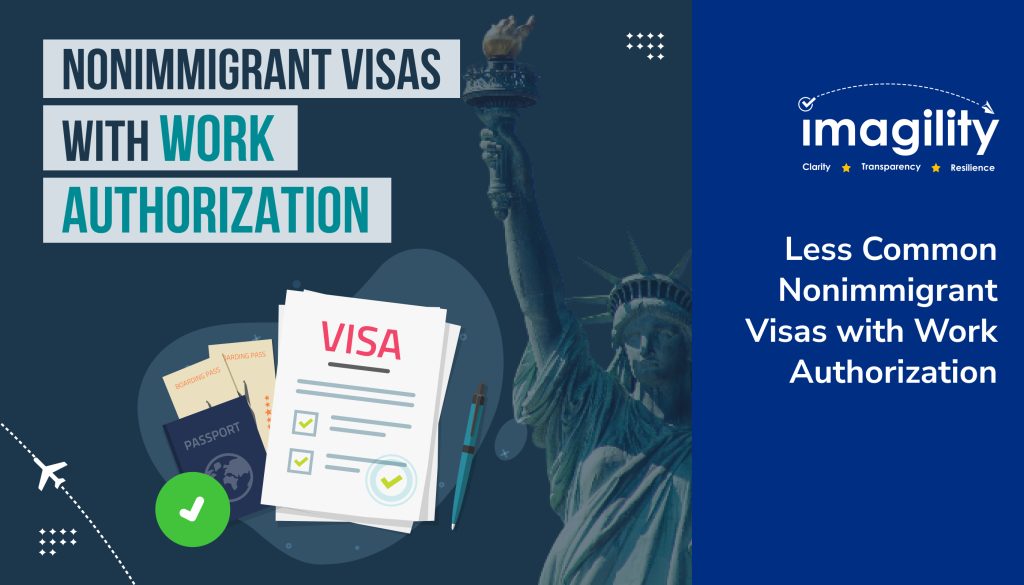When it comes to obtaining work authorization in the U.S., the H-1B visa is the first visa type to come to mind. The H-1B visa remains a widely used and discussed visa for skilled workers. it’s far from the only nonimmigrant option for those seeking temporary employment in the United States.
Beyond the mainstream choices, there are several lesser-known nonimmigrant visas that provide work authorization. These options may apply to individuals in specialized professions, those involved in international exchange, or those with unique business or cultural qualifications. Understanding these alternatives can be especially valuable for employers, attorneys, and prospective employees looking to navigate the complex landscape of U.S. immigration law.
Below, we explore some of the less common U.S. nonimmigrant work visas that might just be the right fit for specific circumstances.
1. O-1 Visa: Individuals with Extraordinary Ability
The O-1 visa is designed for individuals who possess extraordinary ability in the sciences, arts, education, business, or athletics. It’s not just for Hollywood celebrities, this visa is used by top-tier professionals who can demonstrate sustained national or international acclaim in their field.
Key Features
- No annual cap
- Initial stay of up to 3 years, extendable
- Requires a U.S. employer or agent as a sponsor
- Strong evidence of extraordinary achievement is required
2. P Visas: Performers, Artists, and Athletes
The P visa category supports internationally recognized athletes, artists, and entertainers — as well as their support personnel.
P Visa Variants
- P-1A: Internationally recognized athletes
- P-1B: Members of internationally recognized entertainment groups
- P-2: Artists or entertainers under reciprocal exchange programs
- P-3: Artists or entertainers performing under culturally unique programs
These are highly specialized and useful for tours, performances, or training engagements.
3. R-1 Visa: Religious Workers
The R-1 visa is meant for foreign nationals who will work in the U.S. in a religious capacity. This includes ministers, religious instructors, and other individuals affiliated with a recognized religious denomination.
Key Details
- The sponsoring organization must be a tax-exempt nonprofit
- Applicant must have been part of the denomination for at least 2 years
- Initially granted for 30 months, with a possible extension to 5 years
4. TN Visa: For Canadian and Mexican Professionals
Under the United States-Mexico-Canada Agreement (USMCA), formerly NAFTA, the TN visa provides a fast-track option for certain professionals from Canada and Mexico.
Highlights
- No petition required from USCIS (Canadians can apply directly at the border)
- Fast processing and low cost
- Only applicable to specific occupations (e.g., engineers, accountants, teachers)
This visa is ideal for cross-border professionals engaging in temporary employment in the U.S.
5. E-3 Visa: For Australian Nationals
The E-3 visa is available exclusively to citizens of Australia who are coming to the U.S. to work in a specialty occupation.
Similar to H-1B, but this category
- Is available only for Australians
- Requires a Labor Condition Application (LCA)
- Has a cap of 10,500 visas per fiscal year (rarely reached)
This visa is a great H-1B alternative for qualified Australians.
6. H-2B Visa: Temporary Non-Agricultural Workers
While the H-2B is more common in certain industries (hospitality, construction, landscaping), it’s still underutilized in many business sectors.
Use Case
- For temporary or seasonal non-agricultural work
- Employer must prove a temporary need and that no U.S. workers are available
- Subject to an annual cap (66,000 per year)
For employers with short-term labor needs, the H-2B can be a practical solution.
7. Q-1 Visa: Cultural Exchange Visitors
This visa is specifically designed for international cultural exchange programs approved by USCIS.
Who it’s for
- Participants in programs that provide practical training and employment
- Activities must share the history, culture, or traditions of the participant’s home country
- Often used by theme parks or cultural institutions
It’s niche, but valuable in education and tourism-related industries.
Why Consider These Lesser-Known Options?
While they may not make headlines like the H-1B, these nonimmigrant visa categories can offer:
- More flexibility
- Shorter processing times
- Fewer restrictions or annual caps (in some cases)
- Pathways to attract diverse talent
For employers navigating talent shortages or looking to hire specialized professionals, these visas may provide strategic advantages.
Final Thoughts
In a changing immigration landscape where demand often exceeds supply for the most popular visas, it pays to look beyond the usual options. These less common nonimmigrant visas with work authorization offer unique opportunities for both employers and foreign nationals, especially when used creatively and compliantly.
Need help identifying the best visa option for a specific case? Platforms like Imagility simplify the process by providing built-in intelligence, document management, and compliance tools to support attorneys, employers, and petitioners at every step of the immigration journey.










